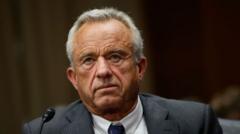Kennedy’s appointment raises questions about vaccine skepticism and public health policies as he oversees major health agencies.
**RFK Jr Takes Charge as US Health Secretary Amid Controversy**

**RFK Jr Takes Charge as US Health Secretary Amid Controversy**
Former Presidential Candidate Robert F. Kennedy Jr. Sworn In as Health and Human Services Chief.
In a highly contentious political environment, Robert F. Kennedy Jr. was sworn in as the new Secretary of Health and Human Services, a pivotal role overseeing approximately 80,000 federal employees and a substantial budget of a trillion dollars. The former presidential candidate's confirmation came after a narrow Senate vote of 52-48, with no Democratic support. During this session, several lawmakers expressed deep concerns regarding Kennedy’s previous comments on vaccines and health misinformation.
President Donald Trump himself performed the swearing-in ceremony in the Oval Office, marking a significant moment in his cabinet revamp efforts. Earlier in the week, another controversial nominee, Tulsi Gabbard, was confirmed as director of National Intelligence, emphasizing a deliberate strategy by the president to position particular figures in critical government roles swiftly.
Kennedy is set to manage essential public health organizations, such as the CDC, FDA, NIH, and Medicare/Medicaid services. His history with vaccine skepticism has raised eyebrows, especially considering his role as the founder of the anti-vaccine group, Children’s Health Defense. While Kennedy asserts he is not anti-vaccine—highlighting that his children are fully immunized—his advocacy for increased scrutiny and safety studies for vaccinations continues to garner criticism.
In the Senate hearings, Kennedy faced tough questioning about his past statements regarding immunizations and the significant role of the pharmaceutical industry in healthcare. His views on abortion also invited scrutiny; while he professed support for states' rights in the matter, many Democratic Senators accused him of abandoning his pro-choice stance to gain Trump's nomination.
Protests erupted during the hearings, reflecting public concern over Kennedy’s potential influence on public health policy. However, his ambitious pledge to "make America healthy again" struck a chord with some Republicans, many of whom, despite earlier reservations, eventually supported his nomination.
Significant Republican voices, including Senator Bill Cassidy, a physician, ultimately supported Kennedy's appointment, asserting the need for a healthier nation. However, critics remained vocal, with long-time Kennedy detractor Mitch McConnell articulating alarm over Kennedy's associations with discredited health claims, particularly about the polio vaccine.
As attention now shifts to Trump's remaining cabinet nominations including Howard Lutnick for Commerce Secretary and Kash Patel for FBI director, the implications of Kennedy's position will undoubtedly resonate across various public health initiatives in the U.S., stirring ongoing debate regarding the future of healthcare policy under his leadership.
President Donald Trump himself performed the swearing-in ceremony in the Oval Office, marking a significant moment in his cabinet revamp efforts. Earlier in the week, another controversial nominee, Tulsi Gabbard, was confirmed as director of National Intelligence, emphasizing a deliberate strategy by the president to position particular figures in critical government roles swiftly.
Kennedy is set to manage essential public health organizations, such as the CDC, FDA, NIH, and Medicare/Medicaid services. His history with vaccine skepticism has raised eyebrows, especially considering his role as the founder of the anti-vaccine group, Children’s Health Defense. While Kennedy asserts he is not anti-vaccine—highlighting that his children are fully immunized—his advocacy for increased scrutiny and safety studies for vaccinations continues to garner criticism.
In the Senate hearings, Kennedy faced tough questioning about his past statements regarding immunizations and the significant role of the pharmaceutical industry in healthcare. His views on abortion also invited scrutiny; while he professed support for states' rights in the matter, many Democratic Senators accused him of abandoning his pro-choice stance to gain Trump's nomination.
Protests erupted during the hearings, reflecting public concern over Kennedy’s potential influence on public health policy. However, his ambitious pledge to "make America healthy again" struck a chord with some Republicans, many of whom, despite earlier reservations, eventually supported his nomination.
Significant Republican voices, including Senator Bill Cassidy, a physician, ultimately supported Kennedy's appointment, asserting the need for a healthier nation. However, critics remained vocal, with long-time Kennedy detractor Mitch McConnell articulating alarm over Kennedy's associations with discredited health claims, particularly about the polio vaccine.
As attention now shifts to Trump's remaining cabinet nominations including Howard Lutnick for Commerce Secretary and Kash Patel for FBI director, the implications of Kennedy's position will undoubtedly resonate across various public health initiatives in the U.S., stirring ongoing debate regarding the future of healthcare policy under his leadership.





















